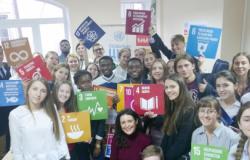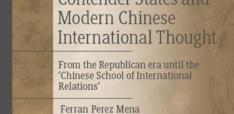Universities, Academics and the 2030 Agenda for Sustainable Development

Graham Long explores the preliminary findings of research on the role academics see for themselves in realising the SDGs.
Universities, globally, have a unique place in accelerating implementation of the SDGs, even as they face uneven contexts and challenges. They can play a key role in engaging youth as a force for change, and in helping to generate the knowledge, analysis and expertise needed to understand and implement the SDGs as a universal and interlinked agenda. Some recent resources and initiatives have been launched to guide universities in these areas – notably the Sustainable Development Solutions Network’s (SDSN) Guide for Universities, and the SDG Accord, an initiative to encourage universities and academics (and institutions of further education too) to publicly commit to the SDGs. Universities are talking about SDGs, too – from the Higher Education Sustainability Initiative (HESI) event on the final day of the 2017 High Level Political Forum, to my own university’s conference on this two weeks ago.
Much has been said about universities and the SDGs, but there is little research around what role academics see for themselves. To address this gap here, I draw on the preliminary findings of research I recently conducted with the help of Ana Flamind, Louise Luxton, and Dani Morgan at Newcastle University. We contacted 400 academics in developing countries to ask them about the SDGs in the context of their countries’ Voluntary National Reviews (VNRs) this summer, receiving 87 responses. In this blog I want to highlight three key messages around SDGs and academics, linking the findings from this specific research to the wider picture around the role of universities.
1.The SDGs as relevant for academic research
Mapping university research against the SDGs, and showing how the work being undertaken is relevant to these global challenges, is central to the SDG Accord. The alignment of research with the goals is also a focus of the SDSN guide. But where academics don’t see their work as SDG-relevant, such mapping could seem artificial and undesirable. Our findings, helpfully, show that for the academics who responded to our survey – from a diverse range of social and natural science disciplines, applied and abstract – almost all saw that the SDGs spoke to their areas of expertise:

This doesn’t mean, though, that universities should stop at mapping research against the goals. One particular weakness of our study is that we didn’t investigate the place of the SDGs in teaching, and this is something we can address next time around. More broadly, future work could focus on the role of universities in contributing to driving SDG implementation across all aspects of their operations: SDSN’s listing of areas for university action across the goals (pages 24-26 of the guide) is an especially important resource.
2. Academic involvement in Voluntary National Reviews
One aspect of this wider role that needs more attention is the participation of academics in review and monitoring of the SDGs, globally, regionally, and in country contexts. Analysis, critical thinking, assessment of complex data, and problem-solving are important parts of the academic skillset and of universities’ wider role. These processes of monitoring and review, furthermore, should be “open, inclusive, participatory and transparent” (para 74 of a/res/70/1). The SDSN guide, however, mentions university involvement in national and local review only in passing, as far as I can see, and spends only two sentences sketching global and national processes of review – even though SDSN themselves do global review really well. The SDG Accord is deliberately more limited in its scope, but this is something that a future development of the Accord might encourage reporting around.
Our survey asked about this issue in the context of the 2017 VNRs. In our survey, 48% of 85 respondents on this question knew that their country had agreed to undertake a VNR, but only 31% of 87 respondents knew the process by which their VNR was being conducted and only 33% of 85 respondents agreed that there were opportunities for academic engagement.
The academics who responded want to get involved through a range of means:

This, perhaps, offers some pointers for governments on how to facilitate academic involvement – as part of a wider effort to make reviews inclusive for all stakeholders. But it also prompts a set of questions about how academic and multi-stakeholder networks, partnerships and other forms of coordination could support this involvement, given the apparent desire for coordination.
3.The demand for information and collaboration
Perhaps the key finding of our survey research is just how great the academic desire for information around the SDGs is – even amongst academics who already knew about the goals. Respondents overwhelmingly thought more information on the SDGs themselves, on review structures at global, regional and national levels, and on the UN’s Global Sustainable Development Report would be very valuable (scores of 9 or 10 on our scale). There is a connection here with the mapping discussed under (1). It is one thing to see which targets are relevant to your research, but quite another to understand the Agenda2030 framework and its accompanying governance. In the UK context, for example, it is common for research directed at the challenges of developing countries to be mapped onto particular SDG targets, but it is not clear, yet, how far this translates into genuine understanding of the goals as integrated and universal, or into knowledge of the new institutions and processes around the SDGs.
Respondents also thought collaboration between countries was important, suggesting the need for networks and coordinating organisations to fill this gap:

The need for collaboration and partnership goes beyond the VNR context, of course. Another area for investigation in the future is how universities can best develop the north-south and south-south partnerships that are needed as conduits for sharing research, expertise, and capacity-building – addressing SDG targets 17.6 and 17.8 – despite the diverse and common challenges they face.
For all the talk of the SDGs by universities, and the mapping of academic research onto goals, then, these findings prompt questions: is enough work going on to build a deep understanding of the SDGs amongst academics? and how can these collaborations to drive and deliver the goals – north-south and south-south – be fostered and coordinated?
Dr Graham Long is an Associate Director of the Institute for Sustainability at Newcastle University in the UK. From 2013-15 he worked on the SDGs as part of Beyond2015, including co-facilitating the Beyond2015 working group on follow up and review. He currently works with stakeholders on issues around SDG data, review and follow-up structures. Two of his ongoing projects are the Together2030 survey on stakeholder participation in the 2017 VNRs – and a similar project on the upcoming 2018 VNRs – and, with UK Stakeholders for Sustainable Development, SDG monitoring in the UK.
This article was originally published on the Together 2030 blog.
Together 2030 (www.together2030.org) is a civil society initiative that promotes national implementation and tracks progress of the 2030 Agenda for Sustainable Development. The Initiative, set up in December 2015, seeks to generate knowledge and project voices from civil society and stakeholders around the world on the challenges and opportunities for the 2030 Agenda. Together 2030 brings together civil society and non-governmental actors to discuss the way to formulate and implement roadmaps at national level and hold governments to account at all levels. As of November 2017, 570 organizations have joined Together 2030 from more than 100 countries. 72% of which are based in the Global South.
DISCLAIMER. The views expressed in this blog are the responsibility of the authors and do not necessarily reflect the views of the Together 2030 Initiative and its members. This was reposted with permission from the Institute of Sustainability.
Image Credit: UN Ukraine via Flickr (CC BY 2.0)

